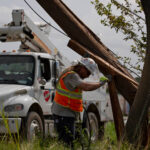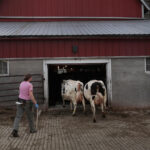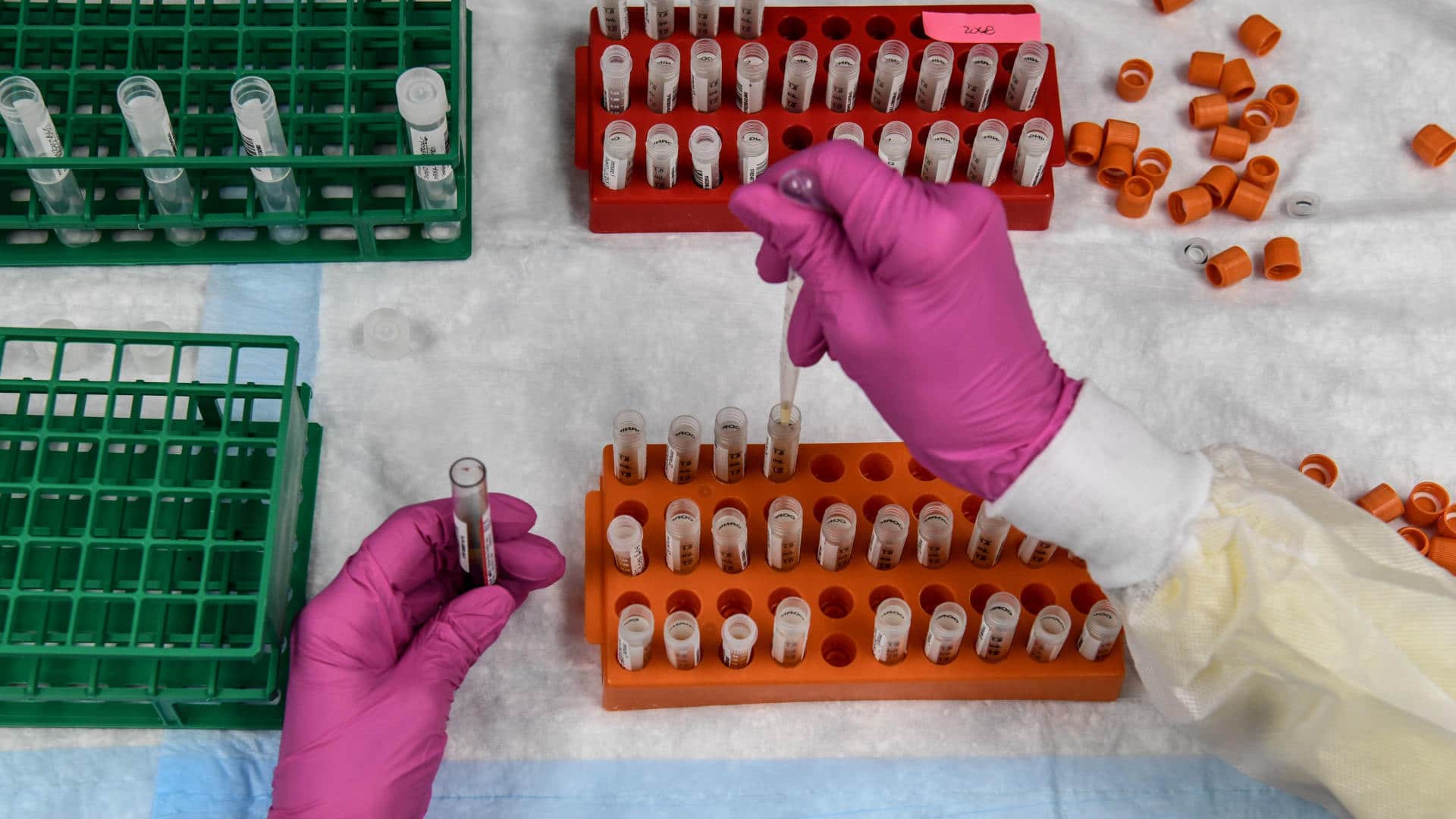On Wednesday, U.K. regulators approved public use of a Covid-19 vaccine developed by Pfizer and BioNTech. The swift decision to greenlight the vaccine — the authorization process is slightly slower in the U.S. — made Britain the first Western country to launch widespread vaccination for Covid-19.
Next week, according to British health officials, the first 800,000 doses of the vaccine will be available, with millions more to follow. At Pfizer facilities in Massachusetts, Michigan, Missouri, and Belgium, production is gearing up to manufacture more than one billion doses of the vaccine by the end of next year.
With similar approvals pending in the U.S. for the Pfizer and BioNTech shot and another vaccine candidate, health officials this week took new steps to determine who will receive the first immunizations. On Tuesday, a panel at the Centers for Disease Control and Prevention recommended that the first vaccines go to health care workers and employees and residents of nursing homes, which have been responsible for more than 100,000 Covid-19 deaths in the U.S. Essential workers — including educators, firefighters, and food service workers — are expected to get the immunizations next, along with people with underlying conditions and those aged 65 or older, who are at higher risk of severe complications from Covid-19.
The panel, which includes 15 voting members, weighed various ethical and epidemiological considerations in making its recommendations. Its decision to prioritize correctional workers but not incarcerated people has drawn criticism, as major outbreaks in prisons, jails, and detention facilities that have led to more than 1,500 inmate deaths.
A safe and effective vaccine, experts say, cannot come quickly enough. While other countries have effectively managed Covid-19 rates through diligent public health work and strong health care and worker support systems, rates in the U.S. have surged, with little sign of a coordinated federal government response besides the vaccine rollout. Around 2,800 people died from Covid-19 in the U.S. on Wednesday, a new record. More than 100,000 people are now hospitalized, according to data from the Covid Tracking Project.
The coming months, CDC director Robert Redfield said this week, are “going to be the most difficult time in the public health history of this nation.”
Still, some experts said, the vaccine news offers some cause for optimism, at least in the not-too-distant future. By the end of January, “50M Americans might be vaccinated,” Brown University public health scholar Ashish Jha wrote on Twitter this week, which, he continued, along with immunity conferred by infection, will “start to slow down the spread.”
Also in the News:
• Legislators in Massachusetts voted to pass a bill this week to ban the use of facial recognition technology by police departments across the state. If signed into the law, the bill would make Massachusetts the first state to implement such restrictions. The measure follows years of complaints that facial recognition technology is biased and more often misidentifies the faces of Black people and other minorities. “No one should have to fear the government tracking and identifying their face wherever they go, or facing wrongful arrest because of biased, error-prone technology,” Kade Crockford of the ACLU of Massachusetts told Tech Crunch. If signed by Gov. Charlie Baker, the bill would still allow police to run facial recognition searches against driver’s license photos if they obtain a warrant. With no federal privacy laws regulating use of the technology, Massachusetts joins a patchwork of states and cities working to implement their own rules. Oakland, California, along with San Francisco, have banned city governments from using facial recognition, while lawmakers in Portland, Oregon have gone further by also blocking private companies from using it in public spaces. (Tech Crunch)
• Scott Atlas, the contentious Covid-19 adviser appointed by President Donald J. Trump this summer, announced his resignation this week, drawing expressions of relief from many leaders in the public health community, who had questioned both his qualifications for the job and his policy recommendations. Atlas, a neuroradiologist affiliated with Stanford University’s Hoover Institute, a conservative think tank, advocated for a herd immunity approach to managing the pandemic, dismissed the importance of protective masks, and falsely suggested that children cannot spread the novel coronavirus. In his resignation letter, Atlas said that he had been focused on saving lives and helping Americans through the pandemic. By that point, even Stanford had publicly distanced itself from some of Atlas’s screeds against Covid-protective measures. Criticisms of his stances from doctors battling the pandemic were often blistering. “No single physician did more to harm Americans in such a brief period of time,” wrote Jeremy Faust, an emergency room physician at Boston’s Brigham and Women’s Hospital, on Twitter. And the head of President-elect Joe Biden’s Covid-19 advisory board, Celine Gounder, said she was relieved that Atlas had resigned because he was not qualified for the position he held. (NBC News)
• When National Science Foundation officials decided two weeks ago to decommission Puerto Rico’s iconic Arecibo Observatory, they anticipated a controlled demolition that would spare much of the ailing telescope and its surrounding facilities. They were too late. On Tuesday morning, the telescope’s 900-ton instrument platform, which had been held aloft by suspension cables, came crashing down, slamming into the dish below and kicking up a cloud of debris. By Thursday, footage of the collapse captured by NSF was making the rounds on the internet; in one shot, a drone that had been positioned just above the instrument platform filmed the fateful moment when support cables snapped, sending the platform into a freefall. NSF officials say that no injuries were reported, and that their top priorities are now to keep the site safe, conduct a complete damage assessment, and mitigate any harm to the environment. Still, the unexpected collapse comes as a blow to a scientific community that was already reeling from the decision to decommission the beloved 57-year-old telescope. “We knew this was a possibility,” Elizabeth Klonoff, vice president for research at the University of Central Florida, which managed the telescope, said in a press release. “But it is still heartbreaking to see.” (Space.com)
• For decades, scientists have sought reliable ways to predict the 3D shape of a protein that will emerge from a specific sequence of amino acids, organic compounds that form the basic building blocks of proteins. On Monday, scientists announced that artificial intelligence company DeepMind’s AlphaFold technology had outperformed 100 other teams in a competition to make those predictions. Experts say AlphaFold’s achievement represents a major breakthrough in the field, with broad implications for biomedical research and drug development. “This is a big deal,” computational biologist John Moult, who co-founded the biennial competition, called Critical Assessment of Structure Prediction, or CASP, told Nature. “In some sense,” he added, “the problem is solved.” Andrei Lupas, an evolutionary biologist at the Max Planck Institute for Developmental Biology in Tübingen, Germany, who helped assess teams’ performance in the competition, called AlphaFold’s predictive power a “game changer.” The advance, he told Nature, “will change medicine. It will change research. It will change bioengineering. It will change everything.” (Nature)
• If all goes according to plan, a Chinese capsule will soon deliver to Earth the first fresh batch of moon rocks in more than four decades. On Tuesday, Chinese state media reported that the Chang’e 5 lander had touched down safely, marking the country’s third successful uncrewed landing on the lunar surface since 2013. The probe landed in a previously unvisited area of the moon’s near side known as Oceanus Procellarum, or “Ocean of Storms,” a vast, dark plain of volcanic rock whose origins researchers continue to debate. Using a robotic drill and arm, the lander scooped around 4.5 pounds of lunar dirt into the ascent vehicle, whose successful blast-off from the moon’s surface was reported Thursday. The ascent vehicle must now connect with the orbiter and transfer its cargo into the Earth-bound sample-return capsule. Scientists expect these new samples to be billions of years younger than the rocks retrieved from other parts of the moon in the late 1960s and 1970s by American and Soviet missions. If the samples survive the high-speed reentry into Earth’s atmosphere, they could help scientists fill in gaps in the moon’s geologic history, including how long its interior remained volcanically active and when its magnetic field dissipated. (BBC, CNN)
• And finally: After years of hype and promise, lab-grown meat is heading to market. A world’s first, the cultured chicken, created by the San Francisco startup Eat Just, has been approved for sale in Singapore as an ingredient in chicken nuggets. But it remains unclear whether and when the meat will be available more widely. Singapore is an island city-state with a population of just 5.6 million and, according to The New York Times, the meat will initially be available in a single restaurant. While Singapore’s Food Agency submitted the lab grown chicken to a safety assessment by experts in epidemiology, nutrition, toxicology, and more, the food would also need to pass muster from regulatory agencies in other countries. Eat Just’s chief executive, Josh Tetrick, expressed hope that Singapore’s decision on the meat will encourage quicker approvals in the U.S. and Europe, telling The Times: “It’s not good for what we’re trying to do to make the food system better if Singapore’s the only one that has this approval.” Eat Just already has a vegan egg substitute made from mung beans available for sale in the U.S. and China. (The New York Times)
“Also in the News” items are compiled and written by Undark staff. Deborah Blum, Brooke Borel, Lucas Haugen, Jane Roberts, Frankie Schembri, and Ashley Smart contributed to this roundup.










